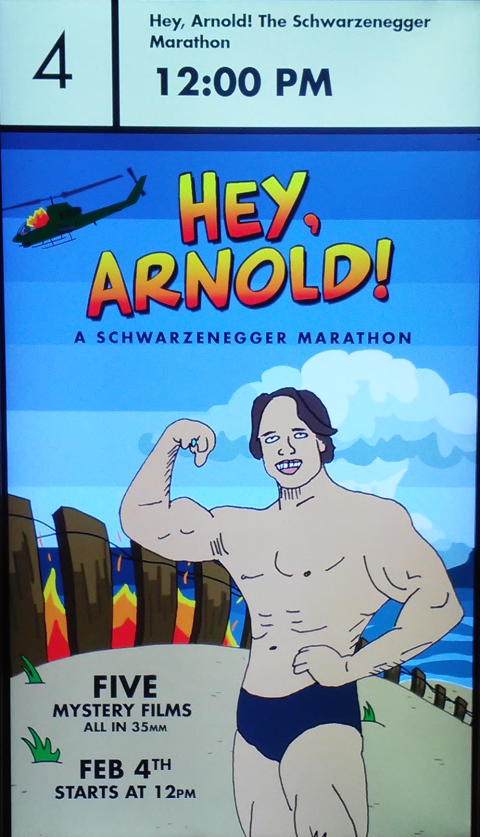
Since the doors first opened in August of 2013, Alamo Drafthouse Yonkers has hosted four fantastic actor-centric marathons: Caged, Stallone Zone, Van Dammage, and Burt Day (aka Cristina Cacioppo‘s Westchester curtain call).
Enter 2017. New Year. New programmer. New marathon.
Lovingly curated by Justin LaLiberty, “Hey, Arnold!” was an epic half-day celebration consisting of five mystery Schwarzenegger films, all on 35mm prints, spanning ten years of the prime of his career (and sparking such debates as “Which Arnold is better: beard or no beard?” …Actually, that’s not a debate at all. Bearded Arnold is clearly superior).
And if that weren’t enough, there was, in fact, a giant cake (which was delicious, by the way) to celebrate his upcoming 70th birthday, among other surprises.
At this point, the man himself needs little introduction, so let’s jump in.
Movie #1: ‘True Lies’ (1994)
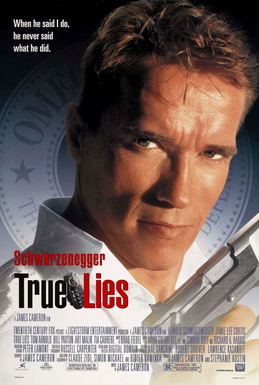
It sounds weird to say because he’s been so influential (for better or worse), but, since his directorial debut in 1981 (which he’d rather you forget), James Cameron has put only eight feature films under his belt, which makes the fact that Arnold has starred in three of them even more significant. Frankly, I’d say True Lies is the last Cameron movie worth watching, but that’s a different discussion.
This was the longest film of the day (and second longest of Arnold’s career, behind T2), which was good, because when you’re stuck to your seat for ten hours, you’d rather get the biggest chunk out of the way first.
Anyway, True Lies is a movie I’ve seen the third act of perhaps dozens of times, as it was a cable staple of the 2000s, so it was definitely worth seeing in it’s entirety, as there was much I either didn’t remember or straight up hadn’t seen (like the fact that a good chunk of the move is in Washington D.C.).
A remake of the 1991 French hit La totale ! (which I totally did not learn just now), True Lies is a top notch 90s action thriller that’s also unafraid of laying the comedy on thick. I particularly enjoy the long, slow push-ins on Arnold’s steely eyes when he knows something the person he’s talking to does not. It’s also a surprisingly grounded film given its over the top nature. Honestly, the only element that took me out of the movie was the fact that Charlton Heston’s character had a patch over his obviously scarred eye, as if he walked in from the set of a different movie.
Really though, the magic of True Lies, other than the action set-pieces and ‘splosions, is that just about everyone in the cast is used appropriately, from Schwarzenegger and Jamie Lee Curtis, to Tia Carrere and Art Malik, to Tom Arnold (fantastic in this) and the now late (sadly) Bill Paxton, everyone’s playing a part they can easily dive into.
It may not be the biggest and baddest Arnold movie in terms of a testosterone-fueled thrill ride, but it’s a very good action/comedy that a lot of people can appreciate (and that doesn’t even include the one-liners [Spoiler]).
Rating: ★★★★☆
Movie #2: ‘The Running Man’ (1987)
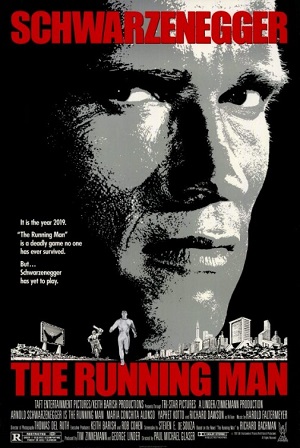
Ah, the far, distant, post-apocalyptic future of 2017!
You won’t hear me say The Running Man is bad, because it’s not. It’s got a solid backbone of a Steven E. de Souza script (just look up his resume; it’s ridiculous), and a cast that’s chock-full of great character actors and action men. I just can’t help but wonder if the movie could have been something more with a more visionary director at the helm. Not that I blame Paul Michael Glaser. Reportedly, producer Rob Cohen went through four other directors (including Andrew Davis, who got production off the ground but quickly went over budget and behind schedule; and who later would direct Arnold in Collateral Damage) before hiring Glaser to basically just get the movie done.
The final product of The Running Man is still eminently entertaining and audience-pleasing, even if not every visual concept works perfectly (it also receives bonus points for giving us some bearded Arnold, if only briefly). Arnold is great, the rogues gallery is great, and the casting of Richard Dawson as an evil version of himself is a move that feels years ahead of its time (you could argue the movie stands on his shoulders more than anyone else; not to mention it leads to one of my favorite incidental lines from Aqua Teen Hunger Force).
The Running Man may not be an all-time great piece of science fiction (like another movie we’ll get to), but it’s no less influential (Hunger Games, anyone?), and, above all, it’s fun, especially with an audience.
Rating: ★★★★☆
Just before The Running Man started we all received one of these glasses, which was a generous and welcome surprise:
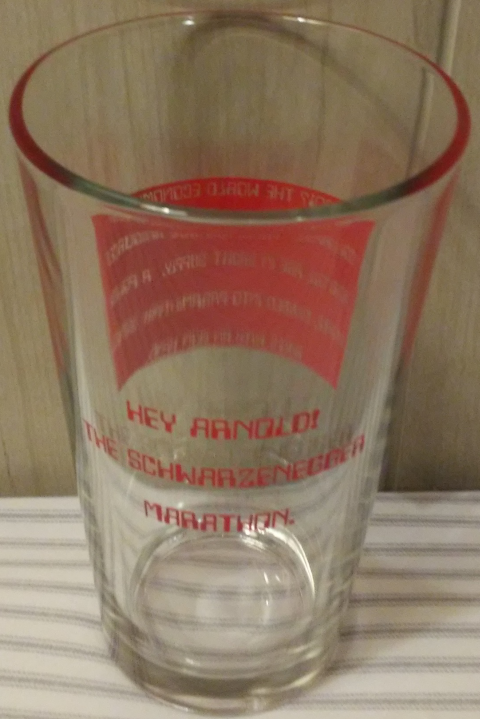

Movie #3: ‘Kindergarten Cop’ (1990)
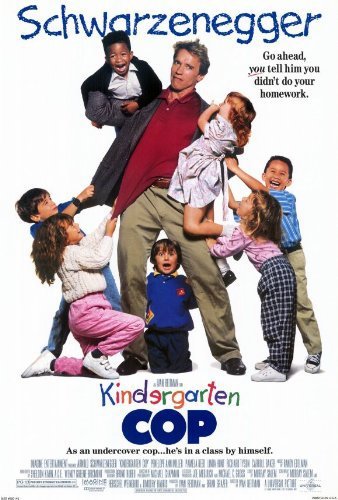
This movie’s something of a miracle.
I mean, I don’t know about you, but if you pitched me Kindergarten Cop, a comedy/action film starring Arnold as an undercover police officer posing as a substitute kindergarten teacher (who has no experience) in order to track down the estranged family of a fugitive criminal, I’d tell you straight up that this concept has failure written all over it.
And yet, somehow, it works.
How much credit should go to whom, I don’t know, but given Ivan Reitman’s track record with Ghost Busters, wrangling that film together from three or four disparate creative visions, I’m going to bet he gets the lion’s share.
Anyway, Kindergarten Cop isn’t perfect. It’s a bit uneven and a bit clunky at times (understandable given the elements it’s trying to hammer together), but, what little action there is is well executed, the comedy mostly works, and, again, it gets bonus points for some bearded Arnold action.
Frankly, the film’s biggest strength is that it never goes completely over the top (except maybe when Pamela Reed suddenly puts on an Austrian accent to maintain cover, but that’s not unforgivable). There’s enough subtlety and realism in the plot, the characters, and, especially, the children, to hold everything together when a different movie would just come unglued.
It wasn’t my favorite of the day, but I’ll be less inclined to flip the channel on it in the future.
Rating: ★★★½
Movie #4: ‘Eraser’ (1996)
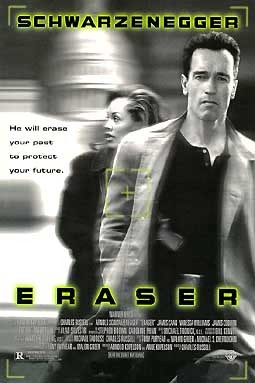
The world of film is not without its binary planets that eventually spin off onto different trajectories. For example, the Coen Brothers collaborated with Sam Raimi earlier in their careers, but it was they, not Raimi, who went on to near-constant critical acclaim in the proceeding decades.
Similarly, Frank Darabont began his career writing with Chuck Russell, but it was he, not Russell, who went onto direct such films as The Shawshank Redemption and The Green Mile, whereas Chuck went on to direct The Mask. Not that we have anything against Chuck Russell, because he also went on to direct a little movie called Eraser.
Every Alamo Drafthouse actor-centric marathon features at least one movie that throws people for a loop, and I’m going to say Eraser is the left field pick in this case, if for no other reason than one of my friends and I had completely discounted it as a possibility (mostly on account of the CGI reptiles).
However, I have to say, Eraser earned its keep.
It may not have been the best movie of the day, nor the best movie of Arnold’s career, but Eraser has a lot going for it. Good villains, solid supporting characters, and enough mid-Nineties action to keep you going for a couple of hours. Whatever elements that haven’t aged well are smoothed over by a rather impressive top-to-bottom cast (including James Caan, James Coburn, and James Cromwell, just to name a few) all putting in solid shifts.
It’ll hurt your brain if you think about it too hard, but, like most of Arnold’s movies, if you’re down for a fun ride, Eraser delivers.
Rating: ★★★½
Movie #5: ‘Total Recall’ (1990)
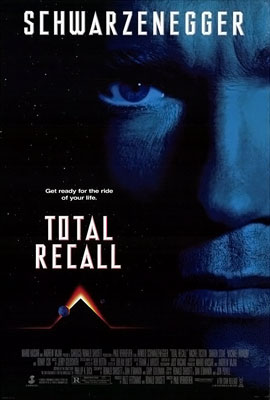
This film was the pièce de résistance, both for the day itself and for me personally, as I’d never seen it before.
Paul Verhoeven as a filmmaker (and perhaps in his life in general) is nothing if not provocative (I mean, if you haven’t seen Elle…it’s provocative), though, by his own standards, Total Recall may be his least provocative movie (you know, outside of all the horrific gore).
What Total Recall is, however, is an extremely successful sci-fi/action film; an all-time great, in my frank opinion. I won’t claim to be an expert, but it’s generally accepted that Philip K. Dick is a difficult writer to translate from page to screen (e.g. Blade Runner‘s 10,000 different versions), but I’m going to take an educated guess that Total Recall is the best filmed adaptation of his work (or at the very least in the running for such an honor).
In all seriousness though, this is a big, bad, beautiful movie, full of amazing visuals (shot in Mexico, which worked well for Arnold before), bloody violence, and a wry sense of humor, while also featuring a good hard sci-fi story with plenty of twists and turns. Total Recall is also a touch philosophical, asking the question of what makes us who we are, which I appreciate.
Naturally, of course, there’s more than a few familiar faces from Verhoeven’s other work (most notably Ronny Cox, Sharon Stone, and Michael Ironside).
On the one hand, I don’t know why it took me so long to see this one, but, on the other, I’m glad I got to see it for the first time in the same way everybody else did nearly three decades ago.
It’s a real treasure.
Rating: ★★★★½
So, that’s it; that’s all. A great day all around.
Thanks again to Alamo Drafthouse Yonkers for hosting and Justin LaLiberty for curating, and to all the servers, runners, cooks, and bartenders who took care of all of us in the audience. My “Mind Eraser” cocktail (whatever was in it) was quite enjoyable.
Unlike in the past, we know what next year’s marathon will be, and I couldn’t be more excited: Russellmania, here we come!



